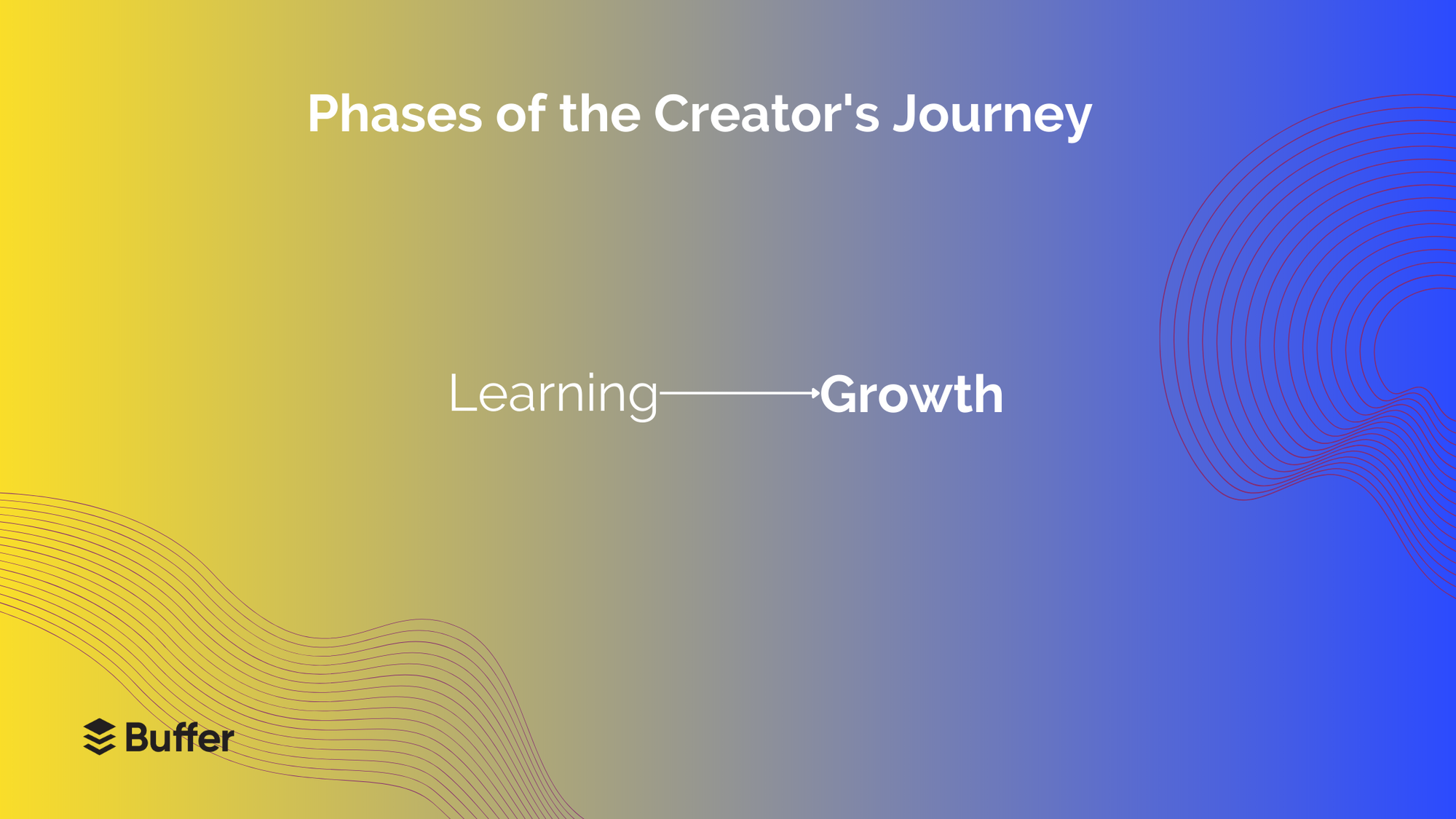
Advice for Growing an Engaged Audience (ft. Top Creators)
If growing an audience is your priority, there are a million and one tactics out there. To stand apart, we’ve asked top creators across different industries, styles, and sizes to share their advice for creating the connection that fosters loyalty.

Content Writer @ Buffer
When you’re ready to shift from the learning to the growth phase of your creator journey, certain things need definition – who exactly your audience is, what exactly you say to them, and how exactly you get that information across.
The definition of “growth” definitely varies, referring to audience size or revenue, or sponsorship slots sold. The common denominator is that you’ve defined a goal and are aiming for it with the content you create and how you do it. And if you’re struggling with growth in relation to your goals, you may not have found the sweet spot just yet.
If growing an audience is your priority, there are a million and one tactics out there. To stand apart, we’ve asked top creators across different industries, styles, and sizes to share their advice for creating the connection that fosters loyalty.
Pick a niche for long-term growth
We find niches interesting because picking one has clear advantages for growth. With a targeted audience, creators can command higher rates, making their content more appealing to the brands trying to reach that audience.

Podcaster Lloyd George emphasizes the advantages of having a niche, stating that it has helped him grow faster and increase the value of his audience. "Having a niche has made it significantly easier to grow, and I think I've grown faster...I can command a higher cost per follower or CPM just based on the fact that the 12,000 people that follow me are aspiring podcasters,” he says.
Another creator who’s reaped the benefits of niching down is Ayomi Samaraweera, who started out on TikTok and consistently shared advice and stories from her corporate career. She landed a brand deal before she had 2,000 followers and reached 10,000 in less than three months. That growth came from sharing her hardwon expert knowledge – another perk of niching down.
If the thing you’d really like to spend your days creating content about only has a handful of people interested, then go for it. You want your love for and expertise in the topics you speak about to shine through in your work.
For any creators concerned about pivoting in the future, Ayomi offers valuable insight. She started out in the corporate careers niche but is now pivoting to content creation. About the switch, she says, "...because I niched down so much, my audience is very specific. Now, when I try to share different content, it may not receive the same views and engagement as my other posts. But I don't define those as flops, because they're reaching a different audience, and I'm evolving as a person."
People who have come to associate you with one topic may not be the biggest fans of your pivot, and they may leave. That’s okay – it’s part of the process. The same door they walk out of is open for your new audience to walk through.
Create for your audience, not the platforms you’re reaching them on
Social media platforms often reward superficial and broadly appealing content, but that’s stuff your audience can find anywhere. If you’re trying to build an engaged audience, your focus should be on strengthening your connection with them, not posing for the algorithm.
"For me, it's essential to focus less on metrics, particularly vanity metrics like views,” says Ayomi. Rather than chasing the largest following, prioritize building an audience that aligns with your goals and will follow you anywhere. To do that, you must prioritize authenticity and avoid the temptation to follow generic templates or jump on trends without adding your unique perspective.
Instead, your work should reflect your beliefs, frustrations, and visions. Basically, let your audience meet you where you are, and as you evolve and grow, share those lessons and experiences with them as well.
Jay Acunzo, writer and speaker, shares the following perspective, “Many people have a monolithic view of both the audience and content, which isn't productive. It's crucial to remember that you, as the creator, influence the work you produce, and this unique approach is your unfair advantage.
So instead of trying to game the algorithm, create what you wish existed and find others who share that vision.
Prioritize self-improvement even when growth looks difficult
When starting, it's normal to feel discouraged and like your growth isn’t meeting your expectations – but growing an audience, much less an engaged one, takes time.
While you can’t always control your growth rate, you can control the steps you take to accelerate it. Consider this three-step approach shared by Stew Fortier, founder of Type.ai:
- Create quality content: Dedicate yourself to the craft and try to create interesting and useful content. People follow you because they believe you can teach them something or find you entertaining and unique. This process takes time, and finding your voice is an ongoing journey. Check out this interview with Jayde Powell for some inspiration for creating quality content (that also resonates with your audience).
- Learn basic marketing skills: Familiarize yourself with copywriting and other marketing skills, as they can help you communicate your ideas more effectively and inspire action. You don't need to be a professional copywriter or marketer, but incorporating these skills in your work can be beneficial.
- Collaborate with others: Partner with people with slightly larger audiences than you. Offer to interview them for your newsletter, podcast, or blog, making them look good in the process. This collaboration benefits both parties, as they get high-quality content to share with their audience, and you gain exposure to a new audience.
Remember, there's no one playbook for success; you need to find the approach that resonates with you and your audience.
Diversify your audience across platforms and maintain engagement
Offering the best content to your audience can sometimes involve directing them off the platforms where they discovered you.
Josh Ho, the co-founder of Referral Rock, highlights the importance of diversifying your audience across platforms, building owned lists, and maintaining engagement for sustained success. "Building email lists, using platforms like Substack, or diversifying across social media channels helps protect your audience base," he recommends.
Diversifying your audience also reduces your reliance on a single platform. If something happens to one, you’re safe in the knowledge that you can reach your audience at any time. Of course, you can’t just say you have an email list or direct your audience to follow you on Instagram once they follow your TikTok. You need to maintain engagement through consistent communication and interesting content.
Understand your audience, then adapt your strategy
Understanding your audience is a crucial aspect of growing an engaged audience. To achieve this, Joy Ofodu, a comedy content creator, recommends that creators begin by auditing their online presence. This means analyzing the platforms you currently use and assessing how well they cater to your target audience. Does your audience really care about your Instagram? Or do they respond better to the text-heavy content popular on Twitter or LinkedIn?
This process helps creators to refine their content strategies and identify the most effective platforms for reaching their desired audience. By focusing on the preferences and needs of the target audience, creators can ensure they are delivering content that resonates with their followers and attracts new ones.
Establishing content pillars is another essential step in maintaining brand consistency and understanding your audience. Content pillars serve as the foundation of a brand's messaging, providing a clear and consistent focus across various platforms. By developing content pillars that align with their target audience's interests, creators can create a cohesive brand identity that appeals to their followers. This consistency strengthens the brand's image and fosters trust and loyalty among the audience, leading to long-term engagement and growth.
Ultimately, understanding your audience is at the heart of building an engaged following. By auditing their online presence and selecting platforms catering to their target audience's preferences, creators can ensure they provide content that truly resonates with their followers. Coupled with establishing content pillars to maintain brand consistency, these strategies will help creators grow and retain a loyal audience that is genuinely invested in their content.
Conclusion
As you work to grow your audience, keep these insights in mind and adapt them to your own unique situation.
Remember that every creator's journey is different, but by staying true to your vision and making genuine connections with your audience, you're well on your way to finding success.
Try Buffer for free
180,000+ creators, small businesses, and marketers use Buffer to grow their audiences every month.
Related Articles

TikTok just introduced Bulletin Boards, similar to Instagram's Broadcast Channels. Here's what you need to know.

We've reopened submissions for the new, cohort-based version of the Buffer Guest Post Program. Learn more in this article.

In this article, you'll find 20+ essential LinkedIn statistics that reveal the platform's reach, effectiveness, and continued growth.